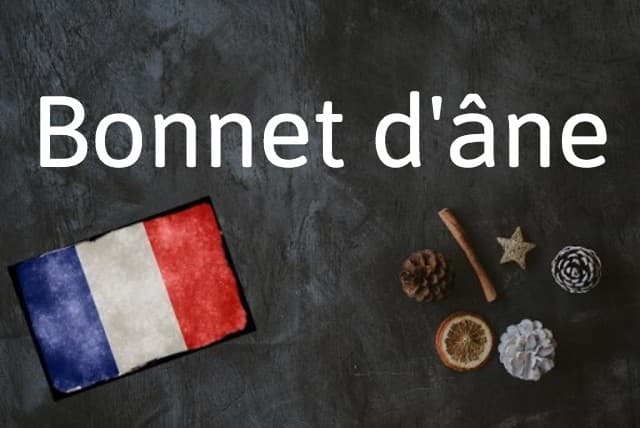French expression of the day: Bonnet d'âne

Why, in France, you don't want to wear a donkey's hat.
Why do I need to know bonnet d'âne?
Because it's an old expression with a rich backstory that teaches us important lessons about the traditions of the French education system.
What does it mean?
Bonnet d'âne means 'donkey’s hat', but it's actually a metaphor for someone being 'dumb', 'a fool', 'buffoon', 'idiot', 'loser', 'dunce' - either because they do something stupid, or because they are lagging behind others.
This French expression is an old one and quite similar to the old fashioned English expression 'wearing a dunce's hat'.
Porter le bonnet d'âne (to wear the donkey's hat) means being a fool, but it's also used as an direct insult: Quel bonnet d'âne ! - What an idiot!
If France is doing especially poorly in something compared to other countries, the country can said to both be un bonnet d'âne or wear le bonnet d'âne.
Bonnet d'âne pour le ministre de l'@education_gouv Nationale, @jmblanquer .#COVID19 #MontageAmor #Confinement https://t.co/2ZQe79rzxE pic.twitter.com/ExJWqAwz5d
— Amor LOUHICHI (@I_M_NOBODY27) January 31, 2021
Origins
Bonnet d'âne originated in French classrooms. Back in the 19th and early 20th century teachers would make pupils wear a special hat as punishment for mischief or poor results at a test or other school work.
Generally the hat was in the shape of triangle, made of paper and sometimes decorated with a donkey's ear sticking out on each side. Often it would have the word âne on its front.
The punished student would be made to wear the hat, sometimes all day, with the very clear message of them being as dumb as a donkey.
Needless to say, it was a pretty humiliating tradition that France scrapped somewhere along the road.
But the expression stuck and wearing a donkey's hat today is commonly used for 'losers'.
Le bonnet d'âne pour Dodo et le trophée pour l'équipe de @manudansle69 ! #LeMag pic.twitter.com/EDpD8PLgcy
— NRJ 12 (@NRJ12lachaine) March 19, 2015
Use it like this
La ville de Marseille en a marre d'être le bonnet d'âne de la France ! - The city of Marseille is sick of being the fool of France!
La France est le bonnet d'âne de l'Europe dans la course à la vaccination contre la Covid-19. - France is trailing the race in Europe to vaccinate the population against Covid.
On a surtout envie d'êviter porter le bonnet d'âne dans la bataille contre les rechauffement climatiques. - We especially want to avoid being the worst student in the battle against global warming.
Comments
See Also
Why do I need to know bonnet d'âne?
Because it's an old expression with a rich backstory that teaches us important lessons about the traditions of the French education system.
What does it mean?
Bonnet d'âne means 'donkey’s hat', but it's actually a metaphor for someone being 'dumb', 'a fool', 'buffoon', 'idiot', 'loser', 'dunce' - either because they do something stupid, or because they are lagging behind others.
This French expression is an old one and quite similar to the old fashioned English expression 'wearing a dunce's hat'.
Porter le bonnet d'âne (to wear the donkey's hat) means being a fool, but it's also used as an direct insult: Quel bonnet d'âne ! - What an idiot!
If France is doing especially poorly in something compared to other countries, the country can said to both be un bonnet d'âne or wear le bonnet d'âne.
Bonnet d'âne pour le ministre de l'@education_gouv Nationale, @jmblanquer .#COVID19 #MontageAmor #Confinement https://t.co/2ZQe79rzxE pic.twitter.com/ExJWqAwz5d
— Amor LOUHICHI (@I_M_NOBODY27) January 31, 2021
Origins
But the expression stuck and wearing a donkey's hat today is commonly used for 'losers'.
Le bonnet d'âne pour Dodo et le trophée pour l'équipe de @manudansle69 ! #LeMag pic.twitter.com/EDpD8PLgcy
— NRJ 12 (@NRJ12lachaine) March 19, 2015
Join the conversation in our comments section below. Share your own views and experience and if you have a question or suggestion for our journalists then email us at [email protected].
Please keep comments civil, constructive and on topic – and make sure to read our terms of use before getting involved.
Please log in here to leave a comment.